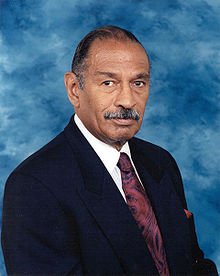Conyers: Frustration of '67 Can Be Found Today Across Nation
Style Magazine Newswire | 8/11/2017, 12:40 p.m.
John Conyers, Published 6:00 a.m. ET Aug. 11, 2017
The 50th anniversary of the Detroit rebellion — highlighted by the release of the movie "Detroit" — allows us the chance to reflect on the state of civil rights in President Donald Trump’s America.
In July 1967, six months into my second term in the U.S. House of Representatives, I watched my hometown tear itself apart. For five days and five nights, citizens and police in Detroit went to war. The carnage was terrifying: 43 dead, more than 1,000 wounded and several thousand more under arrest. Three individuals were shot in cold blood at the Algiers Hotel incident. Hundreds of homes and businesses were destroyed by arson.
I did my best to bring a peaceful resolution to the unrest. As a disciple of Dr. Martin Luther King Jr., I have always believed that non-violence is the best means to achieving equality. No matter how hard times may have been — I have held onto the idea that our legal system will ultimately bend toward justice. I took that message to the streets— encouraging people to go home, to avoid further violence, to not give those who wanted to harm our citizens a reason to do so. Unfortunately, I could not talk the crowds down. Decades of simmering frustration with the biases of local police had finally boiled over.
It is hard to exaggerate just how bad things were in 1967 Detroit. Yes, it was a major industrial city with a progressive mayor, two black congressmen and a vibrant community of activists and unionists. However, all this progress could not overcome the terrible challenges in the community. Part of the story was economic — Detroit had already lost more than 130,000 auto jobs since the time when I graduated from high school and white flight to the suburbs was rampant.
But the larger issue was the violent nature of racism in Detroit in 1967. That June, a group of white men killed a young black Vietnam veteran, Danny Thomas, who had taken his pregnant wife to a park in the white part of town. The murderer was acquitted and his accomplices were never charged. Detroit police were also notoriously heavy-handed with the people they were supposed to protect. There was no conception of accountability when 99 out of every 100 police officers in a majority black city were white.
The city was a powder keg — and at 3 o’clock in the morning on July 23rd, when police broke up a gathering at an after-hours bar on 12th Street with excessive force — they lit the fuse. There was no well of trust, no account of good will, no belief in the legitimacy of the police or the courts to do justice. And when the citizens’ belief in justice — or even the promise of justice — is gone, violence follows.
During this period, more than a hundred other cities would see similar, but less catastrophic, public unrest. In every region, folks were fed up with the system — and so they stopped playing along.
Fifty years later, we are forced to ask whether we have seen fundamental change. The obvious answer is: of course. But any celebration of progress is tempered by the ever-growing list of unarmed civilians who are killed in police-involved shootings. While police forces are more diverse than in 1967, we still see the impact of implicit bias when young black men are shot for innocent conduct. Consequently, some of the same sense of frustration found in the streets of 1967 Detroit is still present in cities across the nation.
For that reason, I continue to pursue police accountability and criminal justice reform. In consultation with law enforcement, the civil rights advocacy community and the Department of Justice, I have introduced two major legislative initiatives that form the core of the police practices effort: the End Racial Profiling Act and the Law Enforcement Trust and Integrity Act. Taken together, these bills are designed to control and provide guidance for routine civilian-police encounters that form the basis for so many tragic policing incidents.
Given the nation’s current political climate — where President Donald Trump finds it appropriate to casually call for police brutality in a recent speech — a reflection of what happened in Detroit is timely and may help shed light on the challenges facing minority communities and the police as we try to address a continuing cycle of inequality across the nation. By viewing current events through the lens of history, we must find the courage to recommit ourselves to ending the cycle of poverty, poor education and violence that still plagues our communities.





